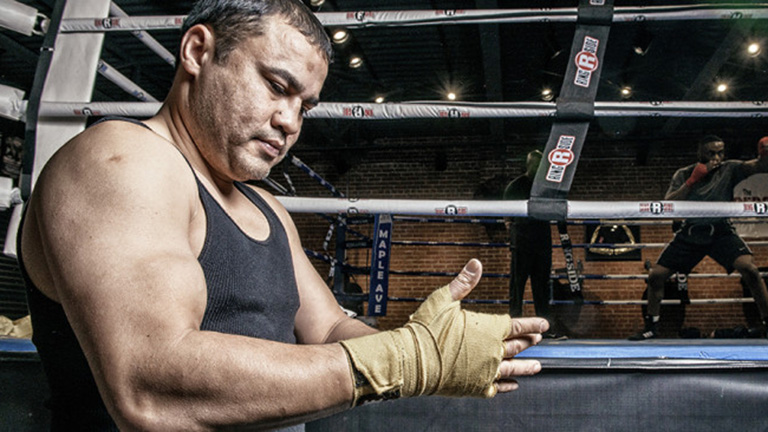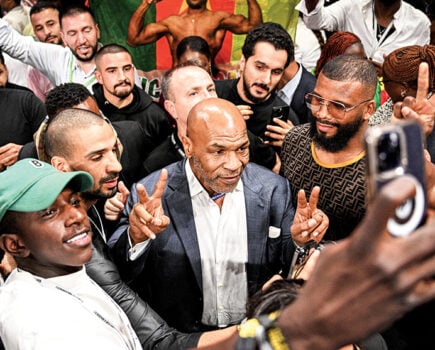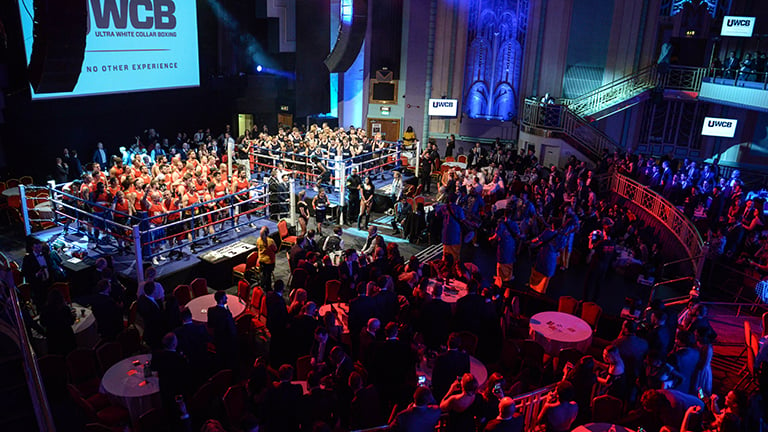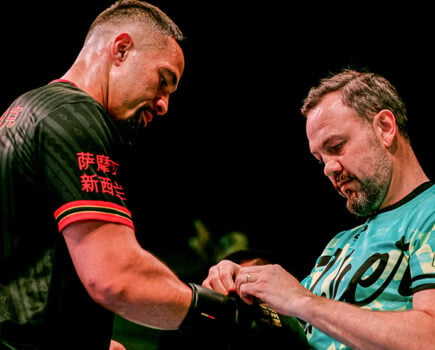THOUGH posted from his own social media account, the former British super-featherweight champion was never going to write the message himself. It would have been too hard. Too hard to think about. Too hard to put into words. It was tough enough, he’d discover, just hitting send. “I really didn’t want to do this,” the message began, “but it has got to the point where I have to. I’ve struggled with life after boxing and messed a lot of things up. I’m looking for a job.”
Send.
The fear, at first, was that the intended recipients would deem it a cry for help and crying for help, Gary Sykes believed, was a sign of weakness. It was a lesson taught to him by boxing, and the rules of the game, for better or worse, stay with a fighter long after the sport, the teacher, has packed up and left. See you and good luck, it’s typically at this point a boxer, this breed of half-formed men and woman for whom fighting is not only a career but a life, might require civilian intervention.
I really didn't want to do this but it has got to the point where I have to.
I've struggled with life after boxing and messed a lot of things up.
I'm looking for a job.
I have a level 2 PT course and starting a level 3 course but not qualified yet.
CAD design mentored!— Gary Sykes (@GarySykesBoxer) August 30, 2018
“My mate wrote that out for me,” Sykes explains. “He thought I was going down the wrong path. I was drinking and turning into a bit of an idiot. He messaged me and said, ‘Mate, if you don’t tweet this message right now, I’m going to fall out with you.’
“I was reluctant, but I thought I had to do it. So, I did. I’m not the cleverest of people. I should have thought about doing that myself. But I’ve got a bit of pride as well.”
Pride can take a boxer to a gym, it can help win fights, and it can drive them on when instinct tells them to stop. Pride, it could be argued, is as crucial to a boxer’s success as speed, stamina, strength and the many other tangible attributes regularly analysed by pundits.
Unlike these attributes, however, it can also be detrimental. It can, for instance, force a fighter to approach a fight in a headstrong manner, ignore the game plan, and receive unnecessary punishment as a result. It can encourage them to take ill-advised risks. Worst of all, in retirement, this period in a boxer’s life that strips them of routine and recognition, it can be the single attribute that comes back to bite them in the most unforgiving of ways. It can derail them. It can silence them.
Should this happen, boxers, as is their custom, will invariably stick it out, persevere and ‘man up’. Yet one day, and the day comes for all of them, a former boxer will realise all that remains from their time beneath the lights are traits developed in the gym, honed over the years, that serve little purpose in the real world. It’s then a life away from boxing becomes every bit as perilous and lonely as a life in boxing.
“I thought I was going to be 30 years of age, a multiple world champion, and retired,” says Liverpool’s former British super-middleweight champion Tony Dodson, now 38. “How far from the truth was that? When you’re 18 or 19, you think you know everything. Really, though, you know nothing. You’re wet behind the ears. The reality of real life is so different. I learned the hard way.”
It’s the lie with which boxing tempts all its applicants: be good, win some fights, secure a title or two, and you’ll never have to work again. But the truth, of course, is quite different. The truth needs to come with a disclaimer or two. It needs to mention the role of good fortune, and it needs to mention the importance of being marketable, finding rivalries and prioritising money over legacy. It’s not romantic, granted. It doesn’t do the boxer’s struggle justice. But it’s preferable to the lie.
“To start with, retirement was so refreshing,” says Sykes, 34, retired since a second-round defeat to Luke Campbell in 2016. “I could eat what I want, I could go out to parties, and I loved it. But then after a while I found it really difficult. I wasn’t training, I wasn’t getting those endorphins, and I got a bit lost. I started drinking, going out, and trying to find buzzes from other places. It was really hard. I missed it so much. Without boxing, I’ve got no focus. I’ve got no willpower at all.
“My life has really gone downhill since I retired. I never put anything in place when I was boxing because my parents never really gave me good advice when it came to investing my money. You never think you’re going to lose.”
It’s bizarre to comprehend a one-time boxer losing focus and willpower, but retirement, by its nature, is one monumental release. It’s a release from work and from all the feelings, emotional and physical, once associated with this work. A boxer will lose other things, too.
“I miss the feeling of routine and the excitement of winning,” says Dodson, whose last fight, a victory, was in 2016. “I do not miss dieting and I do not miss getting punched in the head, though. I do not miss sacrificing everything that’s enjoyable to try and succeed in a sport where you have a very, very, very slim chance of making enough money to live a comfortable life. For what I’ve sacrificed as a human being, and given what I’ve achieved, it really wasn’t worth it.”
Some miss it more than others. Jesus Chavez, for instance, a world champion at super-featherweight and lightweight, maintains he’s as happy in retirement as he was when pursuing boxing gold. He feels this way because, one, he achieved his goal of becoming a world champion, and, two, he flourishes in retirement as a case manager for a restaurant in Dallas, Texas, where he helps disenfranchised youths.
“It’s called Cafe Momentum and what we do there is employ kids,” says Chavez, who last boxed in 2010. “My work is what I really enjoy right now. I have a case load of, like, 13 or 14 kids I look after. They are troubled kids and they come from detention facilities.
“It’s a non-profit organisation. I help the kids with whatever issues they may have: going to their PO (probation officer), running errands. We help with housing, medical insurance and so on. We try to look out for them. This restaurant helps them and gives them a second chance.”
Less of a job, more of a passion, it seems to have also offered Chavez, 45, the chance to move on. “I don’t follow boxing at all,” he admits. “I watch a fight here and there, but that’s it. It’s in my blood, so there’s no way I’ll ever discard it from my life, but I’m not a massive fan. I don’t miss anything about boxing. I never really enjoyed fighting. I know I sound two-faced when I say that because if I didn’t enjoy fighting – which I really didn’t – what made me the most offensive fighter in the sport?”
Pride, perhaps.
Last year, Tony Dodson’s pride was nipping at him and continually reminding him of its presence. It kept him in a state of deflation and depression on the living room sofa, and for months he festered there, putting on weight – mind and body – and rueing everything that led to that point. But then one day, out of the blue, the old ‘Warrior’ swallowed it. He forgot all about his boxing career and what could have been and instead applied to become a different kind of fighter.
“It was a natural progression for me to try and implement the structure from boxing to firefighting,” says Dodson, who’d previously worked for Crosby Fire Service’s street intervention team. “Let’s not forget I’ve been boxing since I was six. All I’ve known is structure and routine.
“I was sitting around turning into a fat b*****d. I went up to sixteen stone eight. I had a car crash and got compression damage in my wrist and I basically sat on my arse and got depressed. I couldn’t punch for fifteen weeks. It was like someone was up there telling me fighting wasn’t for me anymore.
“Thankfully, because I was working part-time for the fire service, I knew when they were going to start recruiting and I applied. When I got confirmed in February, I had to retire (from boxing). I’m getting more money in the fire service.
“I feel blessed. Firefighters are considered heroes. People look up to you. We drive around every day and people are waving at us and asking if they can have a go on the appliances. People are infatuated with firefighters. We have people who actually hang out at the station and take pictures of us as we come out.”
Dodson, a fully-fledged firefighter in Crosby, was recently on the top deck of a ship fighting a fire at five o’clock in the evening and thought not once about his days punching people. Because firefighting, he understands, is the ultimate kind of fighting. It’s selfless fighting. It’s fighting spared the hype and the undercurrent of greed and ego that permeates. In retirement, David Starie, a fellow super-middleweight, chose the same path and Dodson, extinguishing fires alongside former amateur boxer Neil Suku, now knows why.
“I get it now,” he says. “If you’d told me this when I was fighting, I’d have said, ‘No, they’re only doing a bit of firefighting.’ But I know now what we actually risk and how dangerous a job it is. It’s so selfless.
“When you’re going into a building that’s absolutely pitch black, and you can’t see in front of your face, it’s a thousand degrees, and your life is on the line, you know the difference. You can’t get any braver than that. In the ring, you’re being brave, but you know it’s unlikely you’re going to get seriously hurt. In a fire, you’re going into the unknown. A fire is one nasty motherf***er. It can turn in a second.”
Gary Sykes’ social media message, meanwhile, the one he never wanted to write, received an outpouring of goodwill and a job offer. “I got a job ten minutes later,” he says. “I’m now laying granite worktops. It’s just to keep me going at the moment. I’m not a man’s man. My ex-girlfriend used to tell me that all the time. All I knew was boxing.”
Ask former boxers about regret, things they’d do differently if given the opportunity, and the ones able to relinquish pride will rattle off a long list. Dodson and Sykes are no exception. “When I was younger, I could talk clearer than I can now,” Sykes concedes. “I did a graphic design course and a part of me wishes I carried on down that road and didn’t box. I put all my eggs in the wrong basket.”
Sykes’ first post-boxing job was in CAD (computer-aided drafting) design. He liked it initially, because it represented a clean break from the fight game, but then his “head started to go”, and his attendance suffered as a result. He was drinking, he’d split with his girlfriend, and the boxing gym continued to call. He wanted help but wouldn’t dare ask for it. “It’s been hard, but I’m positive I can sort it out,” says the Yorkshireman, who now intends to complete a level three personal training course.
Dodson, on the other hand, is still fighting in one sense but is now fuelled by the sort of contentment some retired fighters will spend decades trying to discover. “The person I owe all of this to is my father, Eric,” he says. “It’s the foundations he secured for me as a human, as a person, as a son, that have made me make these decisions and go for things like a job with the fire service. If he hadn’t put the structure in place, I wouldn’t have the mentality I’ve got. I wouldn’t have gone for it.
“He always said, ‘Tony, you’re brilliant at fighting, but you’ve always got to think about the future. The fire service is a massive and respected organisation and if you could get involved there when you finish boxing it would be great for you.’ He told me it would suit me down to the ground. He was right.”
Grounded. For as long as a boxer’s active, it’s a position they are taught to avoid. In retirement, however, it’s often the key.






